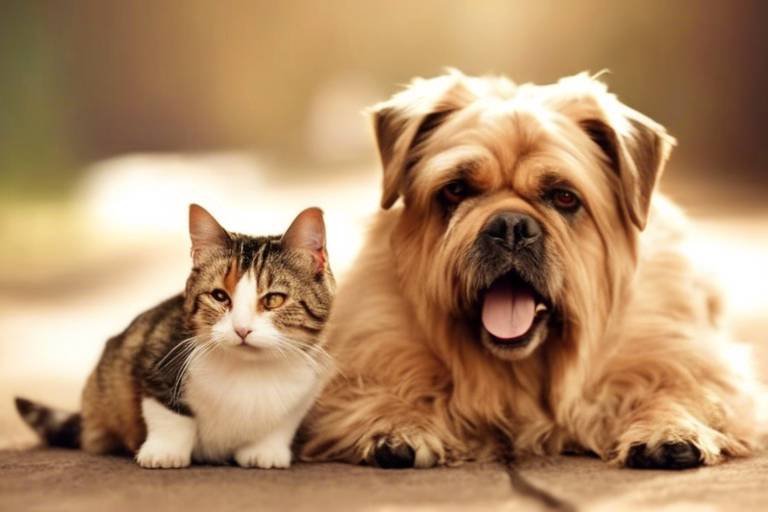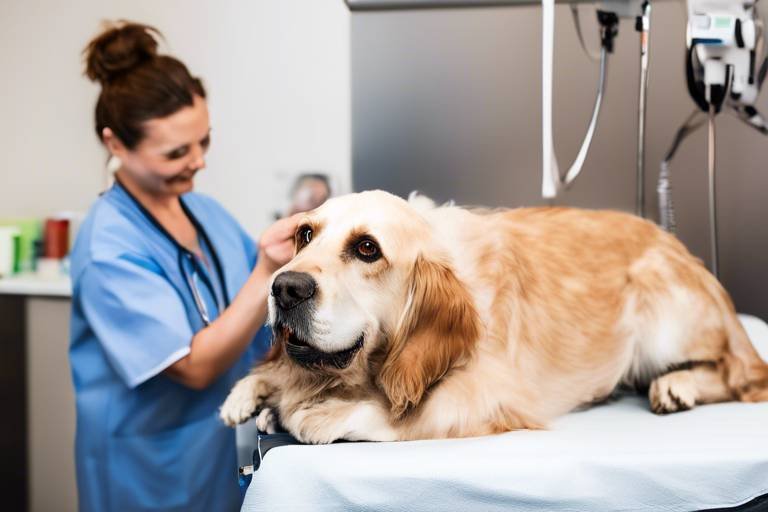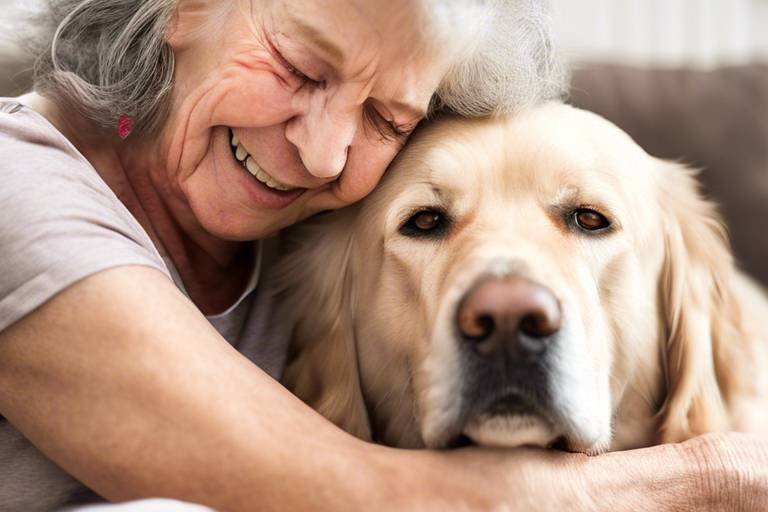Tips for Reducing Stress in Older Pets
As our beloved pets age, they often face a multitude of challenges that can lead to increased stress. This article explores effective strategies to help reduce stress in older pets, ensuring their comfort and well-being as they age. Discover practical tips and insights tailored for senior animals, because every wag of the tail and purr deserves to be filled with joy and peace.
Recognizing the signs of stress in older pets is crucial. Just like humans, pets can experience anxiety and discomfort as they grow older. Common stressors include changes in their environment, loss of companions, or even health issues. Symptoms may manifest in various ways, such as excessive barking, hiding, or changes in eating habits. By understanding these signs, you can take proactive steps to provide the necessary support for your furry friend.
A secure and familiar environment can significantly reduce stress in older pets. Think of it as creating a cozy nook where they can feel safe and relaxed. Modifying living spaces to promote comfort and safety is essential for your aging companions. Simple changes, like providing easy access to their favorite resting spots or ensuring they have a quiet place to retreat, can make a world of difference.
Providing a cozy sleeping area is essential for older pets. Just like we love our comfy beds, pets appreciate a soft and warm space to rest. Selecting the right bedding is crucial; consider orthopedic beds that support their joints and alleviate pressure points. Additionally, placing their bed in a quiet, familiar location can enhance their rest and relaxation, allowing them to recharge their energy for playtime and cuddles.
Loud noises can be particularly distressing for older pets. Imagine being startled by sudden sounds while you’re trying to enjoy a peaceful nap! Learn strategies to minimize these disturbances, such as using soundproofing materials or creating a designated quiet zone in your home. Playing soft music or white noise can also help mask sudden sounds, creating a calmer atmosphere that supports their peace of mind.
Establishing a consistent daily routine can help alleviate anxiety in older pets. Just as we thrive on routine, our pets find comfort in predictability. Regular feeding, walking, and playtime schedules can significantly impact their mental health. For instance, if your pet knows that dinner is served at the same time every day, it can provide a sense of security and stability.
A predictable feeding schedule can provide comfort to older pets. By sticking to a routine, you help them understand what to expect, reducing anxiety around mealtime. Consider using a measuring cup to ensure consistent portions, and try to feed them at the same time each day. This not only helps with their digestion but also strengthens the bond between you and your pet as they learn to trust your cues.
Regular, gentle exercise is vital for reducing stress. Think of it as a way to keep their spirits high while considering their physical capabilities. Activities like short walks or interactive play sessions can be tailored to suit their energy levels. Engaging in play not only keeps them physically fit but also mentally stimulated, helping to ward off anxiety and boredom.
Regular veterinary visits are key to managing health issues that may contribute to stress. Just like we visit the doctor for check-ups, our pets need the same attention. Routine check-ups can help identify and address underlying problems that may be causing discomfort or anxiety. Keeping an eye on their health ensures that any potential issues are caught early, allowing for timely interventions.
Behavioral assessments by veterinarians can provide insights into your pet's stress levels. These evaluations can help you understand if their behavior is a response to pain, anxiety, or environmental changes. Armed with this knowledge, you can implement effective stress-reduction strategies tailored to your pet's unique needs.
In some cases, medication or supplements may be necessary to manage stress. It's essential to work closely with your vet to explore various options available. Discussing the potential benefits and side effects of different treatments can help you find the best solution for your pet, ensuring they receive the care they need to thrive.
- What are the signs that my older pet is stressed? Look for changes in behavior, such as increased vocalization, hiding, or changes in appetite.
- How can I create a more comfortable environment for my pet? Provide cozy bedding, minimize loud noises, and ensure they have a safe space to retreat.
- Is regular veterinary care important for older pets? Absolutely! Routine check-ups can help manage health issues that contribute to stress.
- Can supplements help my stressed pet? Yes, there are various supplements available, but consult your veterinarian before starting any new treatment.

Understanding Stress in Older Pets
As our beloved pets age, they often experience various physical and emotional changes that can lead to increased stress levels. Understanding stress in older pets is crucial for any pet owner who wants to ensure their furry companions are comfortable and happy. But what exactly causes stress in our senior pets? Well, it can stem from a range of factors, including changes in their environment, health issues, and even alterations in their daily routines.
Older pets may exhibit signs of stress in several ways. For instance, you might notice your dog or cat becoming more withdrawn, less playful, or even exhibiting signs of aggression. Some common stressors include:
- Health problems such as arthritis or dental issues
- Changes in their living environment, like moving to a new home
- Loss of a companion, whether human or animal
- Increased noise levels or chaotic household activity
Recognizing these signs early on can help you take the necessary steps to alleviate their stress. Imagine your pet as a delicate flower; the right conditions can help them bloom beautifully, while the wrong ones can cause them to wilt. For example, if your older dog suddenly starts barking excessively or hiding under the bed, it may be a cry for help, indicating that they are feeling overwhelmed.
Moreover, stress can also exacerbate existing health issues, creating a vicious cycle. For example, a pet suffering from arthritis may become more stressed due to pain, which in turn can lead to further behavioral changes. This is why it's essential to be vigilant and proactive in identifying stressors and addressing them swiftly.
In summary, understanding stress in older pets involves recognizing the signs, identifying potential stressors, and being aware of how these factors interact with your pet's overall health. By paying close attention to your furry friend and their needs, you can create a more peaceful and loving environment that promotes their well-being. Remember, a happy pet is a healthy pet!

Creating a Safe Environment
When it comes to our furry companions, especially those who are entering their golden years, creating a safe and comforting environment is paramount. Just like us, older pets can feel vulnerable and anxious in unfamiliar settings. Imagine how unsettling it would be to suddenly find yourself in a new home with strange noises and unfamiliar scents! By modifying your living space, you can help your senior pets feel more secure and at ease.
One of the first steps to creating this safe haven is to ensure that the layout of your home is pet-friendly. This includes removing any potential hazards that could lead to accidents. Consider the following adjustments:
- **Remove clutter**: Keep pathways clear to prevent trips and falls.
- **Secure loose wires**: Tuck away electrical cords to avoid entanglement.
- **Use non-slip mats**: Place mats in areas where your pet frequently walks to provide better traction.
Moreover, it’s essential to designate a specific area in your home where your pet can retreat when they need some quiet time. This space should be away from the hustle and bustle of daily activities, providing a peaceful retreat. You might want to consider placing their bed or a cozy blanket in this area. A familiar scent can work wonders in calming their nerves, so don’t hesitate to add a piece of your clothing or their favorite toy to this space.
Speaking of cozy spots, let’s dive deeper into the importance of a comfortable sleeping area. Older pets often have different needs than their younger counterparts. Their joints may ache, and they may require more support while resting. Investing in a high-quality orthopedic bed can make a significant difference in their comfort level. Look for beds that offer ample cushioning and support, as these can help alleviate joint pain and provide a restful night’s sleep.
Additionally, consider the location of their sleeping area. It should be away from drafts and direct sunlight, ensuring a consistent temperature. If your pet enjoys being close to you, placing their bed in your bedroom can also help them feel secure and connected.
Loud noises can be particularly distressing for older pets. Think about how thunder or fireworks can send even the calmest of dogs into a frenzy. To create a quieter atmosphere, try to minimize sudden sounds in your home. Close windows during storms, use heavy curtains to dampen outside noise, and consider using white noise machines or calming music to mask sudden disturbances. These simple adjustments can help create a soothing environment that promotes relaxation.
In conclusion, by paying attention to the environment in which your older pets live, you can make significant strides in reducing their stress levels. A safe, comfortable, and quiet space not only enhances their quality of life but also strengthens the bond between you and your furry friend. After all, when our pets feel secure, we can all breathe a little easier!
Q: How can I tell if my older pet is stressed?
A: Look for signs such as excessive barking, hiding, changes in appetite, or destructive behavior. These can indicate that your pet is feeling anxious or uncomfortable.
Q: What types of bedding are best for senior pets?
A: Orthopedic beds are ideal as they provide support for aching joints. Look for beds made of memory foam or those specifically designed for older animals.
Q: Are there any calming products I can use?
A: Yes! There are various calming sprays, diffusers, and even supplements that can help reduce anxiety in pets. Always consult your veterinarian before introducing new products.
Comfortable Sleeping Areas
Creating a comfortable sleeping area for your older pet is not just a luxury—it's a necessity. As pets age, their bodies undergo various changes, and they often require more support and comfort during their resting hours. Think of it as setting up a cozy nest where they can curl up and feel safe. A well-designed sleeping space can significantly enhance their quality of life and help them recharge for the day ahead.
When choosing the right bedding, consider options that provide adequate support for their joints and muscles. Orthopedic beds, for instance, are a fantastic choice as they are designed to relieve pressure points and offer the necessary support. Look for beds made from memory foam or gel-infused materials, as these can conform to your pet's shape and provide that extra layer of comfort. Additionally, ensure that the bedding is easily washable to maintain hygiene, as older pets may be more prone to accidents.
Location is equally important when it comes to your pet's sleeping area. Ideally, you want to place their bed in a quiet corner of the house, away from the hustle and bustle. This could be a cozy nook in the living room or a peaceful spot in your bedroom. The goal is to create a space that feels like a safe haven. You might also want to consider adding a few familiar items, like a favorite blanket or a toy, to make the area feel more inviting and personalized.
Moreover, temperature control plays a significant role in your pet's comfort. Older pets can be sensitive to extreme temperatures, so ensure their sleeping area is neither too hot nor too cold. You can use blankets to keep them warm during chilly nights or provide a cooling mat during warmer months. Remember, just like us, pets appreciate a comfortable environment where they can relax and feel at ease.
In conclusion, investing time and resources into creating a comfortable sleeping area for your older pet can pay off immensely. Not only does it help them rest better, but it also contributes to their overall well-being. So, take a moment to evaluate their sleeping situation and make the necessary adjustments. Your furry friend will thank you for it!
- What type of bed is best for older pets? Orthopedic beds are highly recommended as they provide the necessary support and comfort for aging joints.
- How can I ensure my pet's sleeping area is safe? Place the bed in a quiet, low-traffic area and ensure there are no hazards nearby that could cause injury.
- Should I use blankets for my older pet? Yes, blankets can help keep your pet warm and provide additional comfort. Just ensure they are clean and safe to use.
Minimizing Loud Noises
When it comes to our beloved older pets, one of the most overlooked aspects of their comfort is the impact of loud noises on their well-being. Imagine how unsettling it can be for a senior dog or cat, already coping with the physical challenges of aging, to be startled by sudden, jarring sounds. From thunderstorms to fireworks, or even the everyday clatter of household appliances, these noises can create an environment filled with anxiety and fear. So, what can we do to create a more peaceful sanctuary for our furry friends?
First and foremost, it’s essential to identify the common sources of noise that may trigger stress in older pets. Many pets have heightened sensitivities as they age, making them more reactive to sounds that they may have previously ignored. Here are some strategies to help minimize these disturbances:
- Soundproofing: Consider using heavy curtains or soundproofing panels in areas where your pet spends the most time. This can help muffle external noises and create a quieter environment.
- White Noise Machines: These devices can be a game-changer. By producing a consistent sound, they can drown out sudden loud noises and provide a soothing backdrop for your pet.
- Calm Music: Playing soft music or nature sounds can help create a relaxing atmosphere. Many pets respond positively to gentle melodies, which can ease their anxiety.
- Safe Spaces: Designate a quiet area in your home where your pet can retreat during noisy events. This space should be cozy and familiar, perhaps with their favorite blanket or toys.
Additionally, it’s important to monitor your pet’s reactions to noises. If you notice signs of distress, such as hiding, excessive barking, or pacing, it may be time to reassess your environment and make further adjustments. Remember, creating a stress-free environment is not just about minimizing noise; it’s about ensuring your pet feels safe and secure in their surroundings.
Lastly, don’t hesitate to consult with your veterinarian if your pet shows persistent signs of stress related to noise. They may recommend specific strategies or even behavioral therapy to help your pet cope better. After all, our furry companions deserve a peaceful and happy life, especially as they age.
Q: How can I tell if my pet is stressed by loud noises?
A: Look for signs such as hiding, excessive barking, trembling, or destructive behavior. If you notice these behaviors during loud events, your pet may be experiencing stress.
Q: Are there specific breeds that are more sensitive to noise?
A: Yes, some breeds are naturally more anxious than others. For example, herding breeds and those with a history of anxiety may be more affected by loud sounds.
Q: Can I use medication to help my pet cope with noise-related stress?
A: Yes, in some cases, veterinarians may prescribe medication or recommend supplements to help manage anxiety. Always consult with your vet before starting any new treatments.
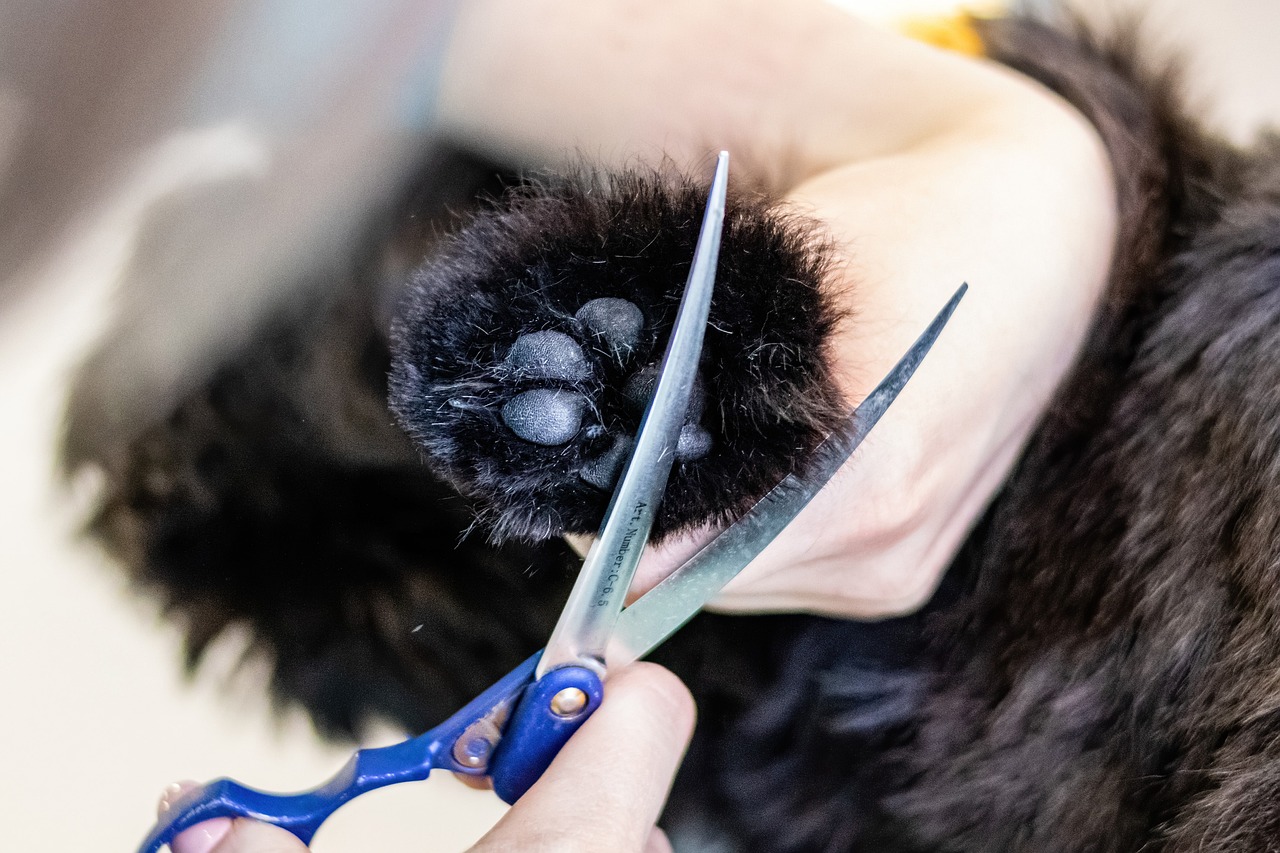
Routine and Consistency
Establishing a consistent daily routine for your older pet is like providing a warm blanket on a chilly night—it brings comfort and security. Just as we thrive on predictability in our lives, our furry friends also benefit immensely from having a structured day. Imagine waking up at the same time every morning, enjoying breakfast, going for a walk, and then settling down for some quiet time. This kind of rhythm can significantly alleviate anxiety in senior pets, making them feel more at ease in their environment.
When it comes to daily routines, think of it as a well-choreographed dance. Each part of the day flows seamlessly into the next, creating a harmonious atmosphere. Regular feeding times, for instance, can help your pet anticipate when their next meal is coming, reducing the stress of uncertainty. It’s like knowing that your favorite show comes on at the same time every week; you can relax and enjoy the moment because you know what to expect.
Moreover, maintaining a consistent schedule for walks and playtime is equally important. Older pets may not have the same energy levels as they once did, but they still crave interaction and exercise. Gentle, regular walks not only keep them physically active but also mentally stimulated. Think of these walks as mini-adventures; they provide an opportunity for exploration and socialization, which can greatly enhance your pet’s mood. Just remember to tailor the duration and intensity of these activities to your pet's physical capabilities.
In addition to feeding and exercise, consider incorporating a routine for grooming and health check-ins. Regular grooming sessions can be soothing and serve as a bonding time between you and your pet. It’s like a spa day that helps them feel pampered and loved. Furthermore, scheduling routine veterinary check-ups ensures that any potential health issues are caught early, reducing the risk of stress related to unexpected illnesses.
To summarize, here are some key elements to consider when establishing a routine for your older pet:
- Consistent Feeding Times: Aim to feed your pet at the same times each day to create predictability.
- Regular Exercise: Short, gentle walks and play sessions should be scheduled to keep them active without overexertion.
- Grooming and Health Check-ups: Make grooming a regular part of their routine and keep up with veterinary visits.
By implementing a routine that encompasses these aspects, you’re not just caring for your pet’s physical needs but also nurturing their emotional well-being. A stable environment filled with predictability can help your older pet feel safer and more relaxed, ultimately enhancing their quality of life as they age.
Q1: How can I tell if my pet is stressed?
A1: Common signs of stress in pets include excessive barking, hiding, changes in appetite, and destructive behavior. Pay attention to these cues to better understand your pet's emotional state.
Q2: Should I change my pet's routine if they seem anxious?
A2: If your pet shows signs of anxiety, consider keeping their routine consistent while gradually introducing changes. Sudden alterations can increase stress, so take it slow.
Q3: How often should I take my older pet to the vet?
A3: Older pets should have veterinary check-ups at least twice a year. Regular visits can help catch any health issues early and keep your pet feeling their best.
Feeding Schedules
Establishing a predictable feeding schedule is more than just a routine; it's a lifeline for your older pets. Just like us, pets thrive on consistency. Imagine waking up every day not knowing when you’ll eat; it would be unsettling, right? This is how your furry friends feel when their mealtimes are erratic. By providing them with a reliable feeding schedule, you not only help to reduce their anxiety but also enhance their overall well-being.
When it comes to feeding older pets, timing is everything. Try to feed them at the same times each day. This can create a sense of security and predictability. For example, if you feed your pet breakfast at 8 AM and dinner at 6 PM, stick to this schedule as closely as possible. This consistency can help them feel more relaxed and at ease in their environment.
Moreover, consider the types of food you are providing. Older pets often have specific dietary needs, and their digestive systems may not handle certain foods as well as they used to. It’s essential to choose high-quality, age-appropriate food that caters to their health requirements. Consult with your veterinarian to ensure that you’re providing the right nutrition tailored to their age, weight, and health conditions.
In addition to the timing and quality of food, the method of feeding can also impact your pet’s stress levels. Some pets may benefit from slow feeders or puzzle bowls, which can make mealtime more engaging and less stressful. This approach not only slows down their eating but also stimulates their minds, making mealtime a fun and rewarding experience.
To help you visualize a structured feeding schedule, consider the following table:
| Time | Meal | Notes |
|---|---|---|
| 8:00 AM | Breakfast | High-quality senior formula |
| 12:00 PM | Snack | Healthy treats or small portions of food |
| 6:00 PM | Dinner | Same as breakfast |
Remember, it’s not just about what you feed them, but also how you feed them. Make mealtime a positive experience by offering praise and affection during and after they eat. This will help associate their feeding schedule with feelings of happiness and security.
Ultimately, a structured feeding schedule is a vital component of your older pet's routine. It promotes stability and comfort, which are essential for their mental health. By prioritizing their feeding habits, you can contribute significantly to their overall quality of life. So, take the time to establish a routine that works for both you and your furry companion, and watch as their stress levels decrease, making way for more joyful moments together.
Exercise and Playtime
When it comes to our beloved older pets, keeping them active is not just beneficial—it's essential! As they age, senior pets may not have the same energy levels as they once did, but that doesn't mean they should become couch potatoes. In fact, regular, gentle exercise can significantly reduce stress and improve their overall well-being. Think of it as a way to keep their spirits high and their bodies strong, much like how a daily walk can lift our own moods.
Engaging in light exercise helps to maintain mobility, promote healthy weight, and stimulate mental faculties. So, what does exercise look like for your senior pet? It can be as simple as a leisurely stroll around the block or a gentle game of fetch in the backyard. The key is to tailor activities to their specific needs, taking into account any physical limitations they may have.
Here are some activities that can be particularly enjoyable and beneficial for older pets:
- Short Walks: Aim for multiple short walks throughout the day instead of one long trek. This allows your pet to explore their surroundings without overexerting themselves.
- Interactive Play: Use toys that encourage gentle interaction, such as soft balls or plush toys. This keeps their minds sharp while providing physical activity.
- Swimming: If your pet enjoys water, swimming can be an excellent low-impact exercise that’s easy on their joints.
- Gentle Stretching: Simple stretching exercises can help maintain flexibility and reduce stiffness.
It's important to observe your pet during these activities. If they seem fatigued or disinterested, don't push them. Instead, adapt the routine to ensure they remain comfortable and engaged. Think of exercise as a way to bond with your pet—it's not just about burning calories; it's about spending quality time together. Plus, it can be a great way for you to get some fresh air and enjoy a little movement yourself!
Moreover, maintaining a consistent schedule for exercise and playtime can help establish a sense of routine, which is comforting for older pets. Just like humans, pets thrive on predictability; knowing when to expect activities can reduce anxiety and enhance their overall mood.
In summary, while your senior pet may not be able to run like they used to, there are plenty of ways to incorporate gentle exercise and play into their daily routine. By keeping them active, you are not only helping to alleviate stress but also enriching their lives in ways that matter most. Remember, every little bit counts, and it's the effort and love you put into these moments that will make the biggest difference in their golden years.
Q: How much exercise does my senior pet need?
A: The amount of exercise varies based on your pet's health and mobility. Generally, aim for short sessions of 10-15 minutes a few times a day.
Q: What if my pet has mobility issues?
A: If your pet has trouble moving, consider low-impact activities like swimming or gentle stretching. Always consult with your vet for tailored advice.
Q: How can I tell if my pet is stressed during playtime?
A: Signs of stress can include panting, whining, or trying to hide. If you notice these behaviors, it may be time to take a break or adjust the activity.
Q: Is it okay to let my pet rest during play?
A: Absolutely! It's important to allow your pet to take breaks as needed. Listen to their cues and let them rest whenever they want.
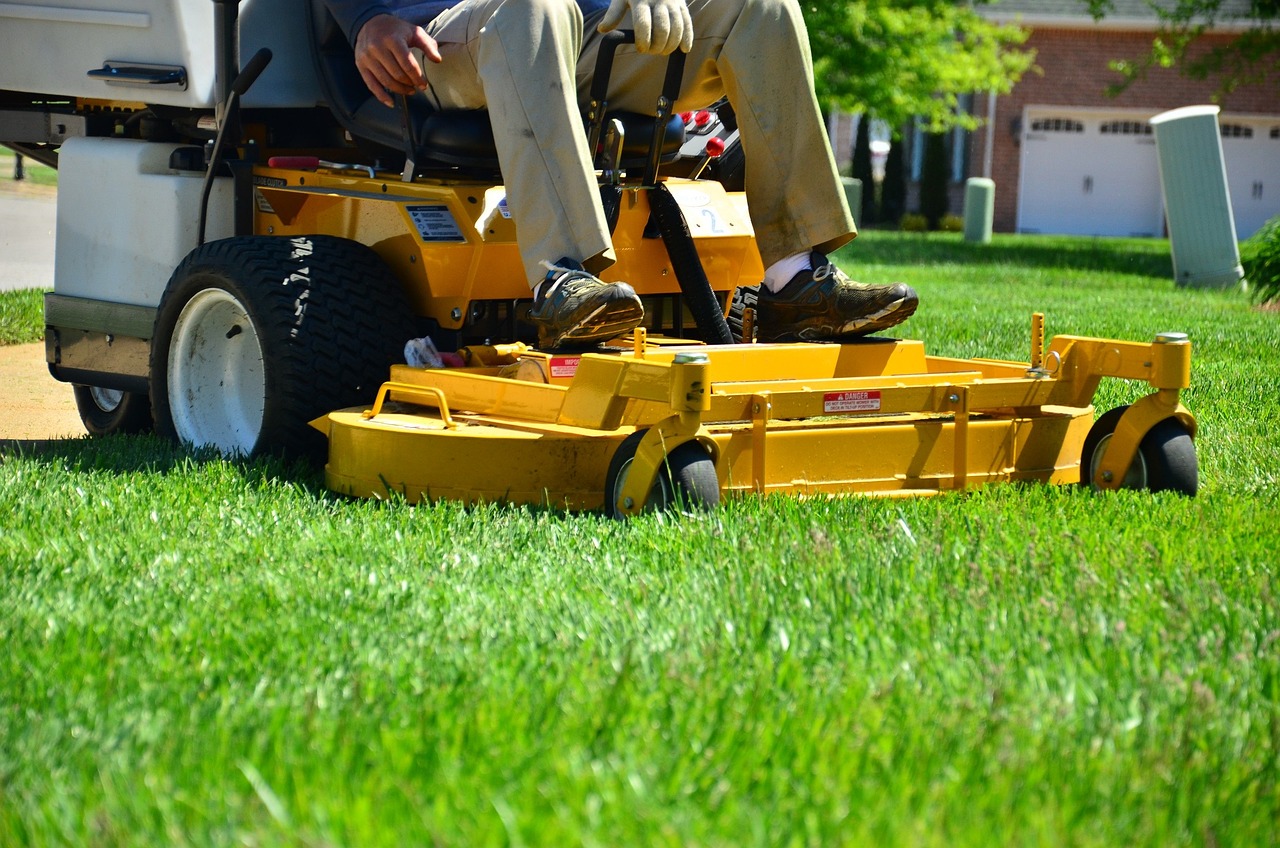
Veterinary Check-ups
Regular veterinary visits are not just a good idea; they are essential for your older pets. As our furry friends age, their bodies undergo various changes that can lead to health issues, some of which may not be immediately visible. Just like a fine wine, our pets need careful attention as they mature. These check-ups can help identify problems before they escalate into serious concerns, allowing for timely intervention and better management of their health. But what exactly should you expect during these visits?
During a veterinary check-up, your vet will typically perform a thorough physical examination and may recommend various diagnostic tests. This could include blood work, urinalysis, or even imaging studies like X-rays, depending on your pet's health status and age. The aim is to get a comprehensive picture of your pet's health, much like a detective piecing together clues to solve a mystery. By understanding their current health condition, you can better tailor your care routine to meet their needs.
It's also a great opportunity to discuss any behavioral changes you've noticed. Has your pet been more withdrawn? Are they having trouble with mobility? These changes can often be linked to underlying health issues that need addressing. Your veterinarian can provide insights into these behaviors and suggest appropriate interventions. Remember, communication is key! Don't hesitate to share your observations; they are invaluable for your vet in formulating a care plan.
Additionally, routine check-ups can help you stay ahead of common age-related conditions such as arthritis, dental disease, or kidney issues. Here’s a quick overview of some common conditions that may be addressed during these visits:
| Condition | Signs to Look For | Potential Treatments |
|---|---|---|
| Arthritis | Difficulty in movement, reluctance to jump or climb stairs | Pain relief medications, joint supplements |
| Dental Disease | Bad breath, difficulty eating, swollen gums | Dental cleanings, tooth extractions |
| Kidney Issues | Increased thirst, frequent urination, weight loss | Special diets, medications |
It's crucial to maintain a proactive approach to your pet's health as they age. Regular veterinary visits not only help in early detection of problems but also allow your vet to monitor any existing conditions. This way, they can adjust treatments as necessary to ensure your pet remains comfortable and happy. Think of it as a wellness check for your beloved companion, ensuring they continue to thrive in their golden years.
In conclusion, don't underestimate the power of veterinary check-ups. They are a fundamental aspect of caring for your older pets, providing peace of mind for you and a better quality of life for them. Remember, a healthy pet is a happy pet!
- How often should my older pet see the vet? Generally, twice a year is recommended for senior pets, but your vet may suggest more frequent visits based on your pet's health.
- What should I bring to the vet visit? Bring any medical records, a list of medications, and notes on any behavioral changes you've observed.
- Can I ask my vet about alternative treatments? Absolutely! Discussing options such as acupuncture, physical therapy, or dietary changes can be beneficial.
Behavioral Assessments
When it comes to our beloved older pets, understanding their emotional and psychological well-being is just as crucial as monitoring their physical health. conducted by veterinarians can be a game-changer in identifying stress levels and potential triggers in senior animals. These evaluations are not just a formality; they provide invaluable insights that can help you tailor your care approach to meet your pet's unique needs.
During a behavioral assessment, your veterinarian will observe your pet's reactions to various stimuli, assess their overall demeanor, and discuss any noticeable changes in behavior. This process often includes questions about your pet's daily routine, interactions with family members, and any environmental changes that may have occurred. By gathering this information, veterinarians can pinpoint specific stressors and recommend strategies to alleviate them.
For example, if your pet shows signs of anxiety when left alone or becomes agitated by loud noises, the vet may suggest creating a more secure environment or implementing calming techniques. This could involve using anxiety wraps, pheromone diffusers, or even simple behavioral modifications like gradually increasing the time your pet spends alone to build their confidence.
Moreover, the assessment may reveal underlying health issues that could contribute to stress. Conditions like arthritis, dental disease, or even cognitive dysfunction can manifest as behavioral changes. By addressing these health concerns, you not only improve your pet's quality of life but also reduce their stress levels significantly.
In some cases, the veterinarian may recommend follow-up assessments to monitor your pet's progress. This ongoing evaluation ensures that any changes in behavior are addressed promptly, allowing for adjustments in care strategies as needed. Remember, your pet's comfort and happiness are paramount, and taking the time for a behavioral assessment can make all the difference in their golden years.
- What should I expect during a behavioral assessment? During the assessment, the vet will observe your pet's behavior, ask about their daily routine, and discuss any changes you've noticed.
- How can I help my pet feel more comfortable during the assessment? Bring along their favorite toys or blankets, and ensure they are familiar with the vet's office to reduce anxiety.
- Are behavioral assessments only for pets showing signs of stress? No, they can be beneficial for all senior pets to identify any potential issues before they become serious.
- How often should behavioral assessments be done? It's advisable to have them at least once a year, or more frequently if you notice changes in your pet's behavior.
Medication and Supplements
As our furry friends age, they may experience various stressors that can affect their overall well-being. In some cases, can play a crucial role in alleviating stress and enhancing the quality of life for older pets. It's essential to remember that just like humans, pets may require different approaches to manage their anxiety and stress levels. So, how do you know if your pet could benefit from these options?
First and foremost, it's vital to consult with a veterinarian who understands your pet's specific needs. They can evaluate your pet's health and determine if medication or supplements are appropriate. Often, a combination of both can yield the best results. For instance, some pets may respond well to anti-anxiety medications, while others may find relief through natural supplements.
When considering supplements, there are several options available that can help calm your older pet. Here are a few commonly used supplements:
- Omega-3 Fatty Acids: Known for their anti-inflammatory properties, these can help improve overall brain health and reduce anxiety.
- Chamomile: A natural herb that can aid in relaxation, chamomile is often found in calming blends for pets.
- Valerian Root: This herb is known for its sedative properties and can help soothe anxious pets.
- CBD Oil: Cannabidiol has gained popularity for its potential to reduce anxiety and stress in pets, but it's crucial to use a vet-recommended product.
While these supplements can be beneficial, it's essential to monitor your pet's response to them. Every pet is unique, and what works for one may not work for another. Keep an eye on any changes in behavior or health and communicate these observations with your veterinarian.
Additionally, medication may be necessary for pets with more severe anxiety or stress. Your vet can prescribe medications specifically designed to help manage these conditions. It's important to follow their guidance closely, as dosage and duration will vary based on your pet's size, health status, and individual needs.
In conclusion, medication and supplements can significantly improve the quality of life for older pets dealing with stress. However, the key is always to work closely with your veterinarian to find the most effective and safe options tailored to your furry companion's needs.
Q: How do I know if my pet needs medication for stress?
A: Signs that your pet may need medication include excessive barking, destructive behavior, hiding, or any drastic changes in behavior. Consult your vet for a proper assessment.
Q: Are there any side effects to pet medications?
A: Yes, like any medication, there can be side effects. It's essential to discuss potential risks and benefits with your veterinarian before starting any treatment.
Q: Can I give my pet human supplements?
A: No, human supplements can be harmful to pets. Always use products specifically formulated for animals and consult your vet for recommendations.
Q: How long does it take for supplements or medication to work?
A: The time frame can vary. Some supplements may provide immediate relief, while medications can take several weeks to show significant effects. Always follow your vet's advice regarding timing and expectations.
Frequently Asked Questions
- What are the common signs of stress in older pets?
Older pets may show signs of stress through various behaviors such as excessive barking, hiding, changes in appetite, or even aggression. It’s essential to watch for changes in their usual demeanor, as these can indicate they are feeling anxious or uncomfortable.
- How can I create a safe environment for my aging pet?
To create a safe environment, ensure that your pet has a comfortable sleeping area, free from drafts and noise. You can also remove any hazards in your home, such as sharp objects or slippery surfaces, to prevent accidents and promote their well-being.
- Why is a consistent routine important for older pets?
A consistent routine helps older pets feel secure and reduces anxiety. By maintaining regular feeding, walking, and playtime schedules, you can provide a sense of stability that can significantly improve their mental health and overall happiness.
- What types of gentle exercise are suitable for senior pets?
Gentle exercises like short walks, light play sessions, or even swimming can be excellent for senior pets. These activities cater to their physical limitations while keeping them engaged and helping to alleviate stress.
- How often should my older pet see the veterinarian?
Regular veterinary check-ups are crucial for older pets, ideally every six months. These visits help monitor their health, catch any potential issues early, and ensure they receive the appropriate care to minimize stress and discomfort.
- Can medication help reduce my pet's stress?
Yes, in some cases, medication or supplements may be necessary to help manage stress in older pets. It's essential to consult with your veterinarian to discuss the best options tailored to your pet's specific needs.
- What should I do if my pet is showing signs of severe stress?
If your pet exhibits severe signs of stress, such as persistent hiding or aggression, it’s crucial to consult your veterinarian immediately. They can conduct a thorough assessment and recommend the most effective strategies to help your pet feel more comfortable.








